
Tooth decay is the penetration of bacteria and acids through microscopic tubules and channels into the underlying structure of the tooth. Cavities are not caused all at once, but slowly with time from certain risk factors. The first step of a cavity is the penetration into the enamel (outer layer) of the teeth. This stage is usually slow-moving because the enamel is extremely dense. At this time, the cavity can be halted and may not need to be fixed, with the right combination of proper oral hygiene and fluoride. Once the cavity can penetrate the underlying tooth structure called the dentin, it can move quickly as the dentin is less dense, and thus needs to be fixed with a filling.
Risk Factors For Tooth Decay
High sugar diet
Eating many foods containing sugars that are gummy, sticky, or chewy gets caught in the biting surfaces of teeth and increases the exposure time to sugar. Examples include dried fruit or sticky candy. Sipping sugary or acidic drinks throughout the day. Exposure time is more influential to cavity risk than quantity. In other words, if you had a small orange juice but sipped it slowly over a few hours, the cavity risk would be higher than gulping down a large soda all at once.
Dry Mouth
A dry mouth is another risk factor. Saliva acts as a natural cleanser for the teeth and without it, bacteria is not cleared well from the teeth, leading to cavities)
Tooth Decay Treatment
Cavities are repaired with dental fillings. During a filling, the decayed section of the tooth is removed, and filling material is placed to fill and contour the shape of the tooth. Common filling materials are composite resin (white fillings), amalgam fillings (metal fillings) and sometimes gold. The bite is then assessed to make sure the filling fits flush with the rest of the teeth.
Tips To Help Prevent Tooth Decay
- Reduce sugar intake
- Less sugary/acidic drinks such as juice and soda
- Reduce sticky, chewy, gummy sugars
- Proper oral hygiene habits
- Regular dental cleanings
- Use of fluoride daily (tap water, toothpaste and mouth rinse)
- Salivary substitutes for dry mouth
If you believe you may have a cavity, or have any questions about them, we encourage you to contact us today to schedule an appointment.
